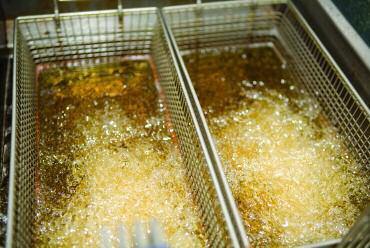
A Vanderbilt student group’s love of nature has led to a project that will produce cleaner-burning fuel on campus. The Vanderbilt Biodiesel Initiative, started by participants of Vanderbilt’s Wilskills program, will take used vegetable oil–stuff that cooks fried foods in campus cafeterias– and recycle it into environmentally friendly biodiesel.
Wilskills, an outdoor education program that uses rock climbing, caving, hiking and white-water canoeing to teach wilderness skills, coordinates a six-day orientation experience for first-year students, as well as additional excursions throughout the year. “We have a van that we take out every weekend, and we were using a lot of gas,” says Derek Riley, MS’06, a Wilskills instructor and current graduate student in computer science. “We’re an environmentally responsible group, we like to think, so we thought we’d look into using biodiesel.”
Biodiesel is a processed fuel derived from biological sources that can be used in unmodified diesel-engine vehicles.Vegetable oil can be used in any diesel engine that has been converted to burn it, “but you have to pay for the conversion,” Riley says. “With biodiesel, if you convert the vegetable oil first, you can use it in any diesel vehicle.”
Enlisting the help of other campus groups, proponents of a campus biodiesel initiative set out to acquire processing equipment. “We have a couple of chemical engineers involved, lots of engineering students, just lots of creative people in general,” says Riley, who cites Professor of the Practice of Civil and Environmental Engineering James Clarke as chief adviser. “We talked about ideas and came up with a design, which we continued to work on and refine.” From the design, the group built a working pilot system that can produce 50 gallons of biodiesel in a batch.
Campus-produced biodiesel will be used in plant operations equipment and possibly in medical center shuttle buses. The Wilskills program has purchased a diesel-engine van that will run on 100 percent biodiesel.
“The project is going to reduce the amount of fuel consumed on campus in significant ways,” Riley says. “It’s going to increase awareness about biodiesel and biofuels, and it’s going to reduce emissions.” Biodiesel produces about 60 percent less net carbon-dioxide emissions than petroleum-based diesel.
“I think there’s enough oil supply on campus that we eventually could be converting 500 to 600 gallons a week into biodiesel,” says Riley.”Down the road we’re looking at potentially making 2,000 gallons of biodiesel a month, which is pretty significant for a student-run project.”